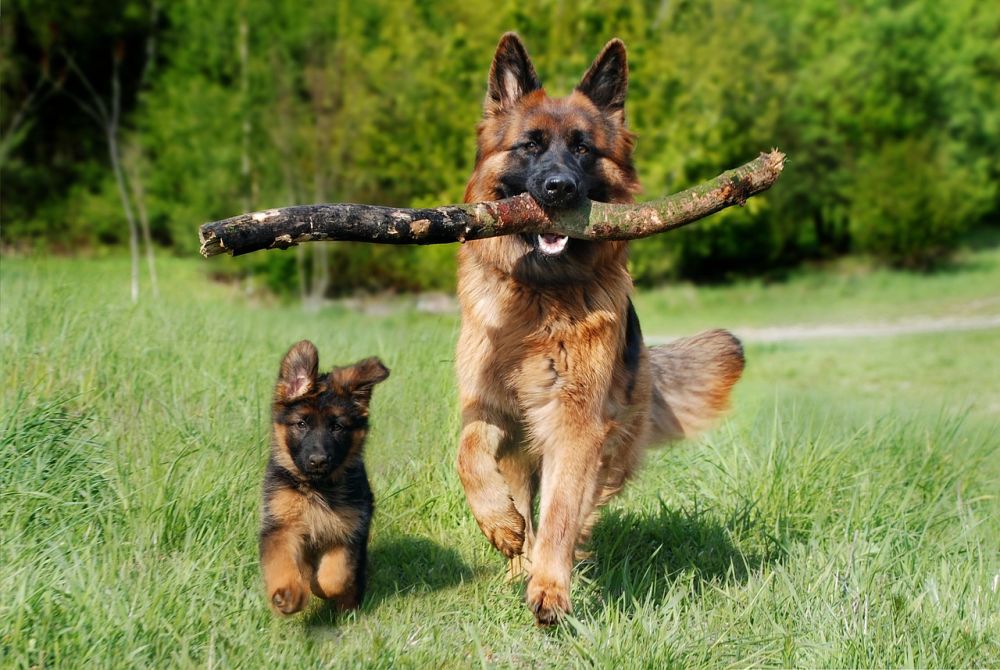
Dog Breed Guide: German Shepherd
German Shepherds are one of the most popular breeds all over the world. Their courage and devotion are unmatched, and they excel at just about anything they are trained to do. Exceptionally versatile, this breed is used in a wide variety of tasks, such as drug detection, search, and rescue, herding, as guide and assistance dogs for the handicapped, as well as military and police service. Apart from being excellent working dogs, the German Shepherd is one of the most loving and loyal canine companions around.
History of the German Shepherd
Dating back to 1899, the German Shepherd is a relatively new breed of dog that owes its existence to a certain Captain, Max von Stephanitz, a career captain in the German cavalry of that time. His aim was to develop a breed of herding dog that was athletic, intelligent, and capable of being trained to do various types of tasks. With Germany becoming more industrialized, von Stephanitz realized that the need for herding dogs was fading but was determined that his breed would carry on as a working dog. It was then that the German Shepherd started being used as a police and military dog, serving as a rescuer, messenger, supply carrier, guard, and sentry, as well as a Red Cross dog, in WWI.
US soldiers noticed the dog’s intelligence and bravery and took several of the dogs home with them after the war. One of these, a five-day-old puppy that was taken home by a US corporal, helped to make the breed one of the most popular in the country and indeed the world after being trained to become one of the most famous canine stars in Hollywood - Rin Tin Tin and appearing in 26 movies.
General Physical Characteristics of German Shepherds
German Shepherds can have short or long hair, ranging in colors from black, black, and tan/cream/red/silver, grey, blue, liver, sable and white. No matter what length of coat they have, though, all German Shepherds shed a lot - all through the year, and need to be brushed constantly.
Males stand from 24 to 26 inches at the shoulders, and females from 22 to 24 inches. German Shepherds can weigh anything from 75 to 95 pounds.
Temperament and Character of the German Shepherds
The German Shepherd is a reserved dog, and although not usually aggressive, he does have an aloof personality. He does not make friends very easily, but once he does, he is extremely loyal. He is approachable and easy-going with his family, but if threatened, he does become strong and protective, making him a very good watchdog.
This breed is highly intelligent and can be trained to do almost anything, from assisting the handicapped to working with soldiers in a war zone.
A well-trained German Shepherd who is often exposed to children - especially since puppyhood, will be a gentle and very protective friend to the children in his family. These are big dogs, however, and there is always a risk of them knocking over little children by accident. Although they are not very friendly with children they don’t know; they can generally be trusted not to hurt them intentionally.
German Shepherds can live quite happily with other dogs and pets, provided that they were taught to do so from puppyhood.
Lifespan of the German Shepherd
German Shepherds have a lifespan of about 10 to 14 years.
Common Health and Personality Issues in German Shepherds
Being active, intelligent dogs, German Shepherds need to have plenty of exercise and stimulation and should not be left alone for long periods of time. They become anxious and bored very quickly and will express themselves in unacceptable ways by barking constantly, chewing items in the home, or digging holes in the garden.
On the whole, a healthy breed, German Shepherds - just like other breeds, are prone to certain illnesses, such as:
- Elbow and hip dysplasia
- Degenerative Myelopathy- a progressive disease of the spinal cord that affects the hind legs
- Gastric Dilatation-Volvulus – often referred to as bloat, this life-threatening condition affects most large, deep-chested breeds
- Exocrine Pancreatic Insufficiency – a genetic disease that affects the pancreas – curable with the proper medical care
- Various types of allergies – allergies ranging from food to contact allergies do affect some German Shepherds. Symptoms are similar to those found in humans and should be checked out by a vet as soon as possible.
Not every German Shepherd will suffer from any or all of the above illnesses, but it is a good idea to be aware of them for those considering acquiring the breed.
